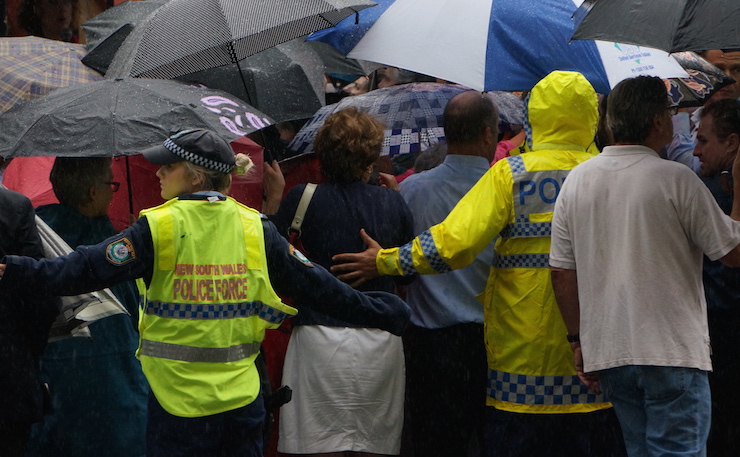OPINION: New laws extend the government’s draconian program to a level that will be felt by all. No liberal democracy cans sustain assaults such as these, writes Angus Reoch.
The Baird Government has officially rendered New South Wales a police state. As if coming out of an Orwellian cocoon, the NSW State Government has eclipsed its previous attacks on civil liberties, notably its anti-protest laws and the much-emulated anti-bikie laws, pushing two new bills through Parliament which will render every resident of New South Wales subject to a shadow legal system. Police powers and discretion have been hugely enhanced, with little, and in some cases absolutely zero, judicial oversight. While the phrase ‘police state’ is commonly thrown around to refer to unchecked increases in state surveillance and executive power, in the case of NSW, the police force now has powers far beyond the scope of the criminal justice system and the protections that go with it.
Delivering upon a 2015 State Election campaign promise, as part of a ‘Cracking Down on Organised Crime’ package, the Baird Administration has passed two Bills through Parliament which will radically reshape the Police’s approach not only to convicted criminals or police suspects, but redefine their relationship to the ordinary public at large. The two Acts in question are the Crimes (Serious Crime Prevention Orders) Bill 2016 and the Criminal Legislation Amendment (Organised Crime and Public Safety) Bill 2016, which passed through both houses of parliament on May 4. Specifically modelled on similar UK laws, these Acts are the furthest developments in a wave of laws which have encroach upon our implied rights to freedom of speech and association.
Where previous laws further limited rights to protest and associate through increased punishments, including excessive fines and jail terms, these new laws empower police on a day-to-day level to the extent that they legalise what would previously be regarded as abuse of police power. They introduce two new police orders, the Serious Crime Prevention Orders and Public Safety Orders, targeting individuals and potentially collectives in the case of the latter, whose implementation allows significant discretion with little judicial oversight. Even worse, they are capable of overriding the ordinary protections provided by the criminal justice system, using principles of civil rather than criminal law in their criteria.
The Orders themselves are quite distinct from one another. SCPOs are court-approved orders issued to control the conditions under which an individual may proceed in their day-to-day life. They are ostensibly targeted towards career criminals in order to reduce the risk of their reoffending. In order to do this, however, SCPOs can impose limitless restrictions upon a person’s liberty – their precedents in the UK target access to computers, telephones, internet, cash carried, among many other life necessities.
While it is true that prison can be merely an interruption of a person’s criminal career, SCPOs go far beyond being a new form of parole. They can not only be targeted at convicted criminals, but also at those who are deemed to be involved in “serious crime related activity… defined to mean anything done by a person that is or was at the time a serious criminal offence”. This not only allows the police to target those who have been deemed innocent under the law, but also introduces a retrospective approach which could criminalise those under laws which are no longer existent. Those with quashed convictions or acquitted of offences would instead be stained with their alleged offence, contrary to the intent of our criminal justice system. While the Orders are judicially reviewed, it is through a one-sided police presentation to a one-judge panel of the Supreme Court (or District Court if the individual is a convicted criminal), preventing judges from making an impartial decision. It also undermines the presumption of innocence.
The standard is similarly dire with regard to PSOs, which allow a Senior Police Officer to disperse an individual or group if the “presence of the person (or class of persons) concerned at the public event or premises or other area concerned poses a serious risk to public safety or security”. Once again, the order does not pertain to the likelihood of criminal activity per se, but merely to a perception of an undefined “serious risk”. These orders may apply to perfectly law-abiding persons, including those whose very presence may create a stir at an event, such as a dissenter to a public rally. Its lack of specificity with regard to ‘class of persons’ is of great concern, effectively allowing legally-binding prejudicial judgements as to where one can and cannot be.

Both Acts would significantly increase the scope of the state and police over the day-to-day lives of its citizens. SCPOs cast a very wide net, with no precise detail about what sort of orders are acceptable, nor any guidance to the judiciary in how to effect or limit these orders. They would be enforceable for up to a period of five years, which in conjunction with the potential scope of these orders is potentially ruinous for an individual’s personal freedom, particularly as the individual concerned does not necessarily need to be even suspected of criminal wrongdoing. Their contravention, a plausible outcome given their wide reach over an individual’s day-to-day life, would be punishable for up to five years, opening up the likelihood of cyclical periods of control. It is worth noting that in the UK the use of SCPOs was amended to enable their extension beyond five years in cases of recidivism.
Where the SCPOs have the capacity to significantly undermine an individual’s basic freedoms, the Public Safety Orders have a more chilling effect on public life and the freedoms of speech and association. They specifically bypass judicial authority by empowering the police to determine if an individual’s presence, rather than actions, constitutes a ‘serious risk’ to public health and safety. Its targeting of ‘persons belonging to a specified class of persons’ is so broad as to potentially target any political, social, racial, religious or age group in a manner which is prejudicial in nature. There is insufficient oversight for such a radical increase in power.
PSOs can legally target minors and the mentally ill, exempting the officer from contacting the relevant guardian if not “reasonably practicable to do so”. If the situation is deemed “urgent” by the relevant authority, PSOs can be communicated verbally, rather than being presented in written form. While they must be subsequently recorded within 12 hours, this opens up significant potential for abuse by police officers – including those who are non-senior – to intimidate individuals where they do not have authority to issue such an order. Their vague implementation is significant given that contravening a PSO is a criminal offence with maximum penalty of five years. While considerations for an individual’s employment and residency are taken into account regarding the prohibited area, they do not overrule the capacity to enforce a PSO. Such orders may last for up to 72 hours, but may differ significantly in their application. If a ‘public event’ is to exceed 72 hours then a PSO may be issued with regard to the length of the event. Appeals may only apply to PSOs given over a period of 72 hours, preventing any capacity for judicial oversight for the bulk of PSOs issued, in a manner which questions their very constitutionality.
While there are stated protections for an individual’s right to dissent, non-violent protest and industrial action, they are not necessarily obstacles for the police, as it is up to their discretion to determine what the event’s ‘primary purpose’ is. It gives significant scope to shut down protest if it is decided to be against the ‘public interest’. Unfortunately, democratic action is not always in the immediate ‘public interest’: it is often disruptive, disagreeable and disorderly, which is why it is traditionally safeguarded as a right in its own regard. By giving police radical new powers whose main frames of reference are ‘security’ and ‘public safety’, it is natural that with this new hammer every public gathering may start resembling a nail.
In handily borrowing these Acts from the UK, the Baird Government has admitted that these Acts are not in response to any particular threat of crime, or due to any inability for police to prosecute or prevent criminal activities. For nebulous purposes, the NSW Parliament has approved two Acts which so greatly undermine our liberal democracy, attacking both collective and individual freedoms, that it is difficult to overstate their scope for abuse of power.
Every advocate of civil liberties is by definition an advocate of an efficient and righteous justice system, the exact kind of system that these laws undermine through empowering the police force without regard for the role of the judicial system. This laws do not make justice ‘more effective’ in NSW, they only grant the police force powers which no liberal democracy should tolerate.
Donate To New Matilda
New Matilda is a small, independent media outlet. We survive through reader contributions, and never losing a lawsuit. If you got something from this article, giving something back helps us to continue speaking truth to power. Every little bit counts.





